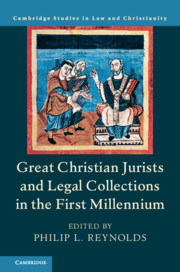Book contents
- Great Christian Jurists and Legal Collections in the First Millennium
- Law and Christianity
- Great Christian Jurists and Legal Collections in the First Millennium
- Copyright page
- Contents
- Contributors
- Preface and Acknowledgments
- Abbreviations
- Part I
- Part II
- 10 Lactantius
- 11 Ambrosiaster
- 12 Augustine of Hippo
- 13 Leo the Great
- 14 Gelasius I
- 15 Dionysius Exiguus
- 16 Benedict’s Rule
- 17 Gregory the Great
- 18 Isidore of Seville
- 19 Pseudo-Isidorus Mercator
- 20 Jonas of Orléans
- 21 Hincmar of Reims
- 22 Regino of Prüm
- 23 Burchard of Worms
- 24 New Horizons in Church Law
- Index
- References
11 - Ambrosiaster
from Part II
Published online by Cambridge University Press: 21 June 2019
- Great Christian Jurists and Legal Collections in the First Millennium
- Law and Christianity
- Great Christian Jurists and Legal Collections in the First Millennium
- Copyright page
- Contents
- Contributors
- Preface and Acknowledgments
- Abbreviations
- Part I
- Part II
- 10 Lactantius
- 11 Ambrosiaster
- 12 Augustine of Hippo
- 13 Leo the Great
- 14 Gelasius I
- 15 Dionysius Exiguus
- 16 Benedict’s Rule
- 17 Gregory the Great
- 18 Isidore of Seville
- 19 Pseudo-Isidorus Mercator
- 20 Jonas of Orléans
- 21 Hincmar of Reims
- 22 Regino of Prüm
- 23 Burchard of Worms
- 24 New Horizons in Church Law
- Index
- References
Summary
Ambrosiaster, an early Christian exegete writing in Latin at the end of the fourth century in Rome, was a thinker whose mind was profoundly shaped by notions of law. He devoted considerable attention to questions of the relation between various kinds of law: the law of nature (lex naturalis), the Mosaic Law, Roman law, and Christian law (“the law of faith”). As an interpreter of the Pauline corpus, he was especially influenced by Paul’s discussion of law in the Epistle to the Romans, where the Apostle argued, “When Gentiles who have not the law do by nature what the law requires, they are a law to themselves” (Rom 2:14). Ambrosiaster saw contemporary Roman law as derived partly from natural law, partly from Mosaic law, and partly from the Greeks. As a result, he did not hesitate to justify both Christian doctrine and Christian practice by referring to Roman legal traditions. Because Ambrosiaster’s Pauline commentary was transmitted in the Middle Ages under the name of Ambrose, and because his Questions on the Old and New Testaments was ascribed to Augustine, he exerted great influence on the subsequent tradition, especially on medieval canon law.
Keywords
- Type
- Chapter
- Information
- Publisher: Cambridge University PressPrint publication year: 2019



